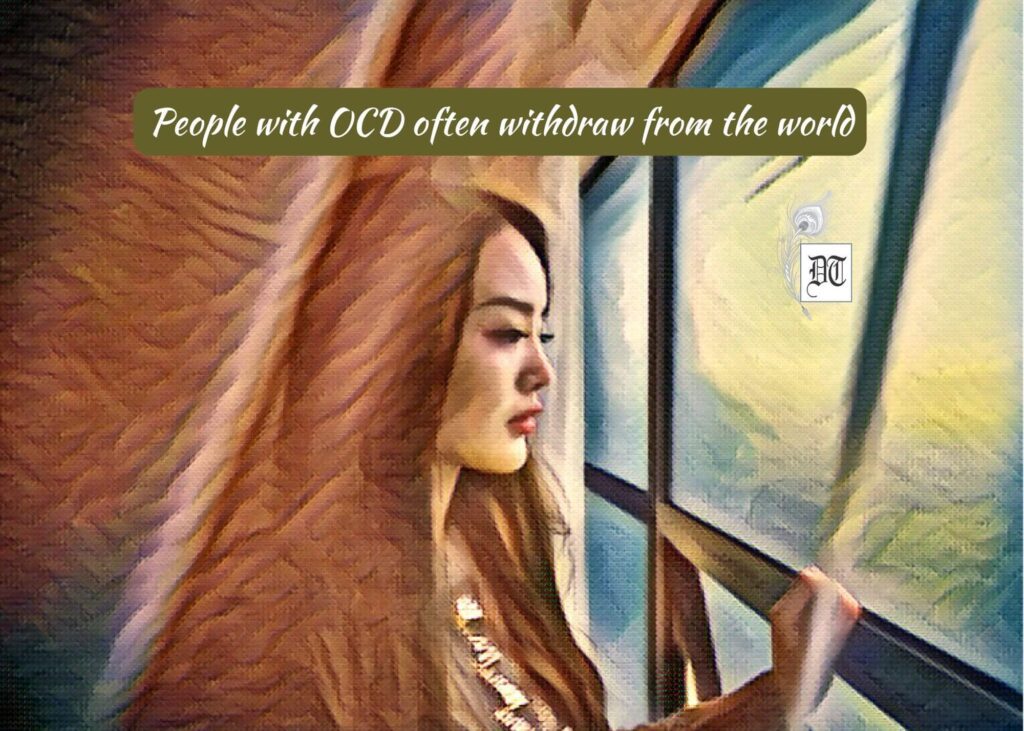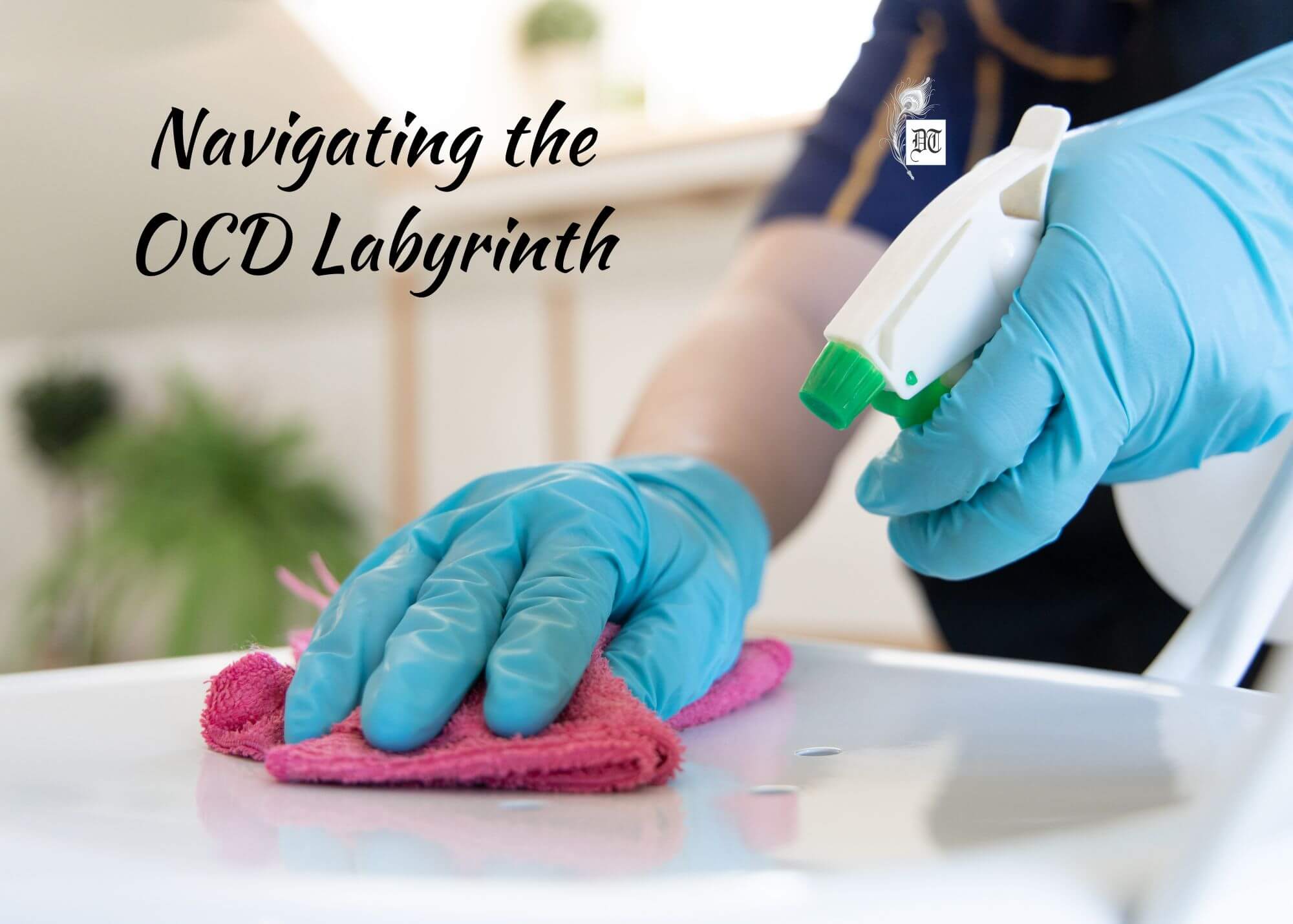Sreelekha discusses Anita’s story of acidophobia, an OCD. She reveals the profound impact of irrational fears on daily life, highlighting the therapeutic journey and potential recovery path – an exclusive for Different Truths.

Anxiety is an indicator of an underlying disease or mental condition. It is born out of persistent worry or fear that can overwhelm a person and hinder their normal behaviour. Anxiety can be common in stressful situations, but it is important to seek help if it is interfering with your daily life.
There are different forms of anxiety associated with Obsessive Compulsive Disorder (OCD). One common form is acidophobia, the fear of acid. People with acidophobia may have intrusive thoughts about acid, and they may engage in repetitive behaviours to attempt to shield themselves from acid’s harm.
Here is an example of how OCD anxiety can manifest in someone’s life. Anita (name changed) is a woman who has acidophobia. She is constantly worried about coming into contact with acid, and she has developed several rituals that she believes will protect her from harm. For example, she never opens bottles of soda or other carbonated beverages, and she avoids eating foods that contain vinegar.
If you are struggling with anxiety, it is important to seek help. There are many effective treatments available, and you do not have to suffer in silence. Talk to your doctor or a mental health professional about your symptoms, and they can help you develop a treatment plan that is right for you.
Initiation
On a hot summer morning, we heard loud shouts coming from Anita’s house. We rushed to her house to see if she needed help. Her mother opened the door and told us that Anita was fine. She just had a sudden outburst of emotion.
Anita was in her early thirties. She was highly educated and had a good job. We didn’t know why she was so upset.
We stood at the doorway of her room, hesitant to go inside. The room was untidy. Anita was sitting on the bed, her face taut and her hair dishevelled. Her eyes were red, and she looked annoyed and helpless. She glanced at us and then turned away. After a few minutes, she asked us to leave.
Anita’s mother was ashamed and frightened by our sudden intrusion.
Anita’s mother was ashamed and frightened by our sudden intrusion. We were at a loss for words, unable to express our concern for Anita.
“She is finding everything very dirty,” Anita’s mother said with a sigh.
“You need to call a tantric to conduct a prayer,” an elderly neighbour said hastily. “It could be a case of possession.”
In our country, people often associate mental illness with possession by an evil spirit. They use religious ceremonies to control irrational behaviour, delaying medical assessment and treatment.
Anita’s OCD problem started when she began filling up the inverter battery with water every quarter. The battery contained mild acid, and no one had ever been harmed by it.
There were no skilled professionals available to fill the battery without spilling acid. Anita took on the responsibility of filling the battery herself.
One time, some acid spilt onto her feet and caused a burning sensation. She rushed to the bathroom to wash it off. Although the acid was gone, she still had a fear of acid.
Compulsive Routines
Following that incident, she developed an unreasonable fear and intense worry. She imagined scenarios where someone, including herself, could be harmed by the acid in the battery. She felt the need to check repeatedly to make sure that no one had come into contact with the acid.
She would change her clothes and make others do the same if she thought they might have come into contact with the acid. She would also wash her hands extensively, believing that they were contaminated. She urged other family members to do the same.
She felt a sense of danger lurking over her family due to the acid in the battery. She believed that there were acid stains on their clothes, bodies, and furniture that needed to be cleaned. She constantly examined everyone and everything for traces of acid. She tried to fix the problems and put things in order as soon as she thought of them. Her thoughts often centred around acid, and she had an irrepressible desire to organise and arrange objects in a specific manner.
The frequent triggers of OCD forced her to follow compulsive, self-designed routines.
The frequent triggers of OCD forced her to follow compulsive, self-designed routines. These routines included asking for reassurance from herself and family members that contaminated objects had been cleaned and taken care of appropriately. For example, she might repeatedly ask, “Are you sure everything’s OK?”
Initially, her family tried to explain to her that her panic attacks were caused by emotional turmoil. However, she was unsure whether to listen to them or to the overwhelming urge to clean that was in her head. As a science student, she knew that she had handled concentrated acids in the past without any harm, so it didn’t make sense to her to be afraid of a mild acid.
Her brain started functioning on a completely different level, unknown to her conscious mind. She tried to impose her fear of acid on her family, but they sometimes refused to listen, and other times, obliged her requests. When they didn’t believe her, she would become angry and frustrated.
The process of obsessively fixing and compulsively addressing every issue was extremely painful and nerve-racking. She felt like she was trapped in a terrifying and confusing world of her own creation. There was no neutral response to any thought related to acid, and the more she dwelled on these thoughts, the more anxious she became. This made it difficult for her to function normally in her daily life. At times, she felt overwhelmed with guilt and distress about the thoughts that were causing her to act in unnecessary ways.
OCD is a chronic, debilitating condition that can trap people in a world of terror and extreme anxiety. People with OCD may worry that something bad will happen if they don’t do something specific, such as checking a doorknob multiple times or washing their hands excessively.
This woman understood that something had changed within her…
This woman understood that something had changed within her, but she couldn’t identify it as OCD until someone told her. We once had an elderly neighbour who was constantly living in fear and anxiety that a calamity would befall us if we didn’t carry out some building repair work. She would often say, “Disasters come unannounced. We have to be prepared for anything.”
She was particularly worried about the common drainage pipe in our building. She believed that it was leaking and that this could cause a major problem.
I remember one cold winter morning when she came to our apartment and insisted that the common drainage pipe was leaking. She was convinced that the leak was coming from our part of the pipe and that it needed to be repaired immediately.
We didn’t hear any water dripping, but we called a plumber to satisfy her concerns.
We didn’t hear any water dripping, but we called a plumber to satisfy her concerns. The plumber investigated the pipe and confirmed that there was no leak. However, she wasn’t satisfied and kept insisting that there must be a crack in the pipe that the plumber couldn’t see.
Later, I realised that she was probably suffering from OCD. This could have been caused by several factors, including her old age, her husband’s health problems, loneliness, financial instability, or past emotional trauma.
The sad part is that most people with OCD don’t seek treatment. This can lead to stress and anxiety that can manifest in other physical health problems, such as hypertension, high blood sugar, and high blood pressure.

Ill Effects
People with OCD often withdraw from the world and stay at home. This is because they feel the need to be near things that they need to constantly monitor in case something dangerous happens. For example, Anita might stay home all day to watch over the inverter battery, in case someone gets too close to it. This isolation can lead to social withdrawal and anxiety about the real world.
OCD can also make it difficult to focus on work, school, or relationships. This is because the mind is constantly occupied with intrusive thoughts and fears. These thoughts can be very distressing and difficult to control. OCD can also lead to memory problems and fatigue.
Family members of people with OCD often feel helpless and frustrated.
Family members of people with OCD often feel helpless and frustrated. They want to help their loved ones, but they don’t know how. It can be difficult to understand OCD and how to cope with it. Family members may also feel guilty, thinking that they did something to cause their loved one’s OCD.
The relief that people with OCD get from carrying out rituals is only temporary. The rituals may provide a sense of control, but they don’t solve the underlying problem. This can lead to a never-ending cycle of anxiety and compulsion. OCD can be a very difficult condition to live with, but there are effective treatments available.
Diagnosis
Anita visited her doctor and learned that she had OCD linked with a phobia of acid. Her doctor referred her to a psychiatrist.
Scientists believe that OCD diminishes the amount of grey matter in different regions of the brain that control impulses, manage senses, process information, thoughts, and feelings, and develop, regulate, and exhibit motor skills.
People with OCD also have low serotonin levels. Serotonin helps to regulate mood and aggression levels, balance senses…
People with OCD also have low serotonin levels. Serotonin helps to regulate mood and aggression levels, balance senses, and help us to remain calm, sleep well, and feel relaxed. Therefore, OCD affects serotonin levels, which can cause anxiety and make patients feel on edge and unable to relax.
There are different types of OCD problems, such as the incessant need to check on things repeatedly. These rituals stem from deep anxieties that may have developed due to trauma or unpleasant experiences during childhood, adolescence, or adulthood.
Anita tried to think of any emotional disturbance that could have caused her anxiety, but she couldn’t put her finger on anything specific. Her aunt, who is a doctor, said that emotional distress is usually caused by accumulated experiences, not just one single instance of suffering.
There is a possibility that depression, which is characterised by persistent sadness or loss of interest in activities, can lead to OCD. Depression can be caused by a combination of biological, psychological, and social factors.
I recalled an instance where a colleague of mine, who I later learned was suffering from depression, once asked me to put my brand-new office bag away from my side of the desk because she found it to be dirty. I was bewildered by her sudden attitude towards my spotless bag, but I yielded to her compulsive manner without questioning her. Later, I understood that she was also suffering from the same emotional agony.
Anita’s neighbours came to know about her psychological disorder.
Anita’s neighbours came to know about her psychological disorder. Most of them were sensitive about it, but one who lived in the flat beneath hers tried to make her feel ashamed or guilty for being ill. This was unconscionable. Instead of helping her fight against her mental anguish, the neighbour installed it in several instances with her unsympathetic preaching about how Anita should try and change her lifestyle to overcome her illness. The neighbour sincerely felt that Anita’s illness had nothing to do with her way of living.
Anita was an introvert by nature, and she seldom opened up to people about her feelings and emotions. These emotions remained bottled up within her, waiting for an opportune moment to burst out incomprehensibly.
Treatment
The doctors were concerned about Anita because she appeared calm and collected on the outside, but her mind refused to assess situations appropriately and became inconsolable whenever she suspected acid contamination. They didn’t rule out the possibility that the inverter battery at her place could spill acid and advised her to move it to another location where she couldn’t see it.
The doctors prescribed medication to help Anita sleep for 8-10 hours a day…
The doctors prescribed medication to help Anita sleep for 8-10 hours a day, which helped to regulate her serotonin levels, stabilise her mood, and calm her down. While the medication helped to reduce her anxiety, the fear of acid remained with her for a long time.
The doctors also recommended meditation for relief. They suggested surrendering to God and asking for help to release oneself from the solitary confinement of one’s mind. They also advised a few breathing exercises and concentrating on the flame of a candle.
OCD can cause the mind to wander to areas that one wishes not to relive. It can make it difficult to focus on one thing and can lead to anxiety and distress. Mental exercises, such as meditation and breathing exercises, can help to mend the mind and reduce anxiety.
One of the doctors recommended that Anita change her place of residence. She followed this advice, and it worked wonders. The doctor also said that she should find a suitable place to station the inverter battery in her new house, in a corner away from her sight. Seeing something that triggered her anxiety every day was not advisable.
Shifting focus away from the mental world of obsessions and compulsions can help to soothe anxiety and distress. This can be a difficult task, but it is essential to manage intrusive thoughts that can affect mental and physical well-being. It is also important to focus on enjoyable activities, such as watching light-hearted movies or listening to music.
A former colleague of mine used to suffer from sudden bouts of anger. As part of his anger management treatment, he was advised to listen to music even when he was at work. I don’t know if this idea worked for him, but it may have helped to distract him from building up a reason to lose his temper and raise his voice at his innocent victims.
Cognitive behavioural therapy (CBT) is the most common type of psychotherapy used to help people with OCD.
Cognitive behavioural therapy (CBT) is the most common type of psychotherapy used to help people with OCD. In CBT, a person who is afraid of touching a doorknob in a public place is advised to hold on to it for several minutes and not wash their hands immediately after that. This helps the person to gradually overcome their fear of contamination.
During the COVID-19 pandemic, people were advised to put in extra effort to sanitize their surroundings and wash their hands frequently. This was because the virus can spread through contact with contaminated surfaces. While people with OCD may also wash their hands frequently, they do so out of fear of contamination that is not based on reality.
Both people with OCD and people who are trying to avoid COVID-19 exposure feel a sense of vulnerability to contamination. However, people with OCD feel this way even when there is no real risk of contamination. They may also engage in excessive cleaning and washing rituals that are not necessary.
Recurrence and Cure
When Anita moved to a new house, her anxiety level declined, but she still had some fear of acid. Her family had gotten rid of the inverter battery, but her neighbours still had them, and this bothered her at times.
Whenever her neighbours visited her house with gifts or food, she would wonder if they had put the items on the inverter battery before bringing them to her. This was a completely irrational fear, but it lingered, nonetheless.
The change in environment helped Anita to deal with her anxiety…
The change in environment helped Anita to deal with her anxiety, but she still had to live with the fear that her mind had created. She was compelled to undertake arduous cleaning rituals, which she often could not complete.
While there are different opinions about the treatment and outcome of this disorder, I believe that with indomitable will and the strength to overcome repeated encounters with invented compulsions, one can be completely cured.
Picture design by Anumita Roy





 By
By
 By
By
 By
By